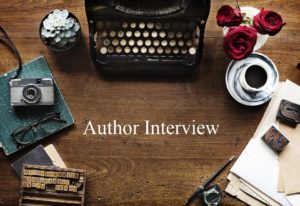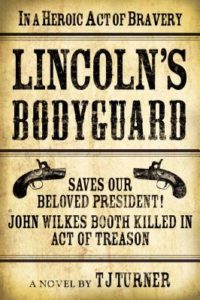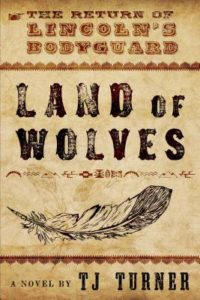An Interview with TJ Turner
 I love meeting writers who have diverse backgrounds and TJ Turner falls into that category easily. He says that, “In my day job I’m a research scientist, and by night (or for 6-month deployments every two years) I’m a reserve military member.” He’s being humble when he uses the terms “reserve military member,” because this is the man who was “awarded a Bronze Star Medal for service in Afghanistan while engaged in ground operations against an opposing armed force.” How’s that for in interesting background? And in between the times he’s employed or deployed, he plays the roles of husband, father, Board president of the Antioch Writers’ Workshop, and writer, just to name a few. His first novel, Lincoln’s Bodyguard, was published in 2015, which was followed by Land of Wolves in 2017. That sequel is also set to launch in paperback tomorrow! I’m grateful that TJ took some time out of his very hectic schedule to answer a few of my questions.
I love meeting writers who have diverse backgrounds and TJ Turner falls into that category easily. He says that, “In my day job I’m a research scientist, and by night (or for 6-month deployments every two years) I’m a reserve military member.” He’s being humble when he uses the terms “reserve military member,” because this is the man who was “awarded a Bronze Star Medal for service in Afghanistan while engaged in ground operations against an opposing armed force.” How’s that for in interesting background? And in between the times he’s employed or deployed, he plays the roles of husband, father, Board president of the Antioch Writers’ Workshop, and writer, just to name a few. His first novel, Lincoln’s Bodyguard, was published in 2015, which was followed by Land of Wolves in 2017. That sequel is also set to launch in paperback tomorrow! I’m grateful that TJ took some time out of his very hectic schedule to answer a few of my questions.
Christina: On your website, you pose the question, “Do we make our own fate, or is it laid out in front of us simply to follow?” What a great question. Do you have an answer?
TJ: I’m so glad you started with an easy question! I think a younger me may have answered this differently—more deterministic in outlook—but I kind of think it’s a mix. I certainly think there is an element of you make it yourself. You put the time in, you set goals, you push yourself, and you continue to improve. I fear mediocrity. I always want to push myself to be the best I can be in whatever activity I pick up. So I think there’s an element of making your own fate. At the same time, I’m more fatalistic now. I’ve done four combat deployments, each more interesting than the last. I’ve been in the right place at the right time too many times to not believe in some form of fate or higher power. I’ve narrowly missed a few bombings, a second or two difference and I would have been on top of it. Or I’ve taken a route that was totally open to us and another unit gets ambushed behind us. At the end of the day, I had no explanation for it. Why them, not me? I didn’t make that happen, not through training or prep, or mission execution. So there’s more to it than just me. This is sounding kind of like a cop-out on your question, but I think the best way to put it might be to say—fate favors the prepared!
Christina: Keeping that first question in mind, do you ever think about where you might be now if you’d chosen to pursue a PhD in writing instead of Mechanical Engineering and Materials Science?
TJ: Nope, I’d be in a totally different place. That’s not a bad thing, though I do like where I’ve landed. Truthfully, that degree is in part what pushed me back toward creative writing. So maybe if I had pursued a PhD or an MFA in creative writing I’d be doing materials science in my living room for fun—okay, who am I kidding, I do that already! But I think the most important thing to have as a writer is an interesting life. And if you can’t have that, then find interesting friends. Or both . . . even better!
Christina: Your books feature Abraham Lincoln. Why Lincoln? And are there other historical figures that you’re drawn to writing about just as much?
TJ: Actually, President Lincoln is the only historical figure who really drew me in as a writing topic. He’s actually not the main character in my series, but he is obviously quite central to the topic and the theme. My other attempts at novels did not have anyone famous like Lincoln. The first novel came to me during a depressing ride home from work one day, when I was thinking of giving up writing all together. I had Fresh Air on, and Terri Gross had some guest she was interviewing about presidents. She mentioned that it would be a different world if Lincoln had a real bodyguard—and the title stuck in my head—LINCOLN’S BODYGUARD. I was already a Civil War history fan, and the deeper I dug into Lincoln, the better the story became for me—complex and layered. He’s an amazing man. He literally forced our nation back together. How could you have a character with any deeper stakes than Mr. Lincoln?
Christina: An extension of that last question might be, if you could be any historical figure for a day, who would it be and why?
TJ: Wow, another easy question! I think there’s too many to name! I think I would choose someone not famous, someone on the sidelines. Can you imagine sitting through the signing of the Declaration of Independence, or seeing the surrender of Lee to Grant? I’m showing my preference for American History, but there are so many great moments. But I think the thing that gets me about this question, is think of all the voices that are completely lost to history. Think of the amazing women who helped forge open the frontier, yet their stories are recorded nowhere. I would want to be one of them. To see their world and then be able to bring it back. We already know enough about the famous people. I’d want to uncover a lost voice.
Christina: On your blog, you speak of serving in the military and you posted the most beautiful letter—the one you hoped would never have to be delivered to your wife. That letter is a good reminder of the sacrifices that all members of a military family must make. It also reminds me how important it is to live in the moment, not the past or the future. How do you live in the moment?
TJ: I think that all goes back to living an interesting life. I don’t like to be bored. I hope I impart that to my kids. I like to be curious, to try new things, to push my own boundaries, and do things that I’m not good at just to say I tried them. My wife will tell you that I have too many hobbies. She’s probably right. But I feel like they feed off each other. Each is a creative endeavor unto themselves, yet as I get better at guitar building for instance, I swear it helps the writing process. Maybe it’s just the time spent alone thinking in my workshop. Basically, I don’t worry about a lot of things. I pursue the activities I feel like doing, things I’m curious about. When a story grabs me, I start writing it down. When I need to go make some more kinetic sculptures in my workshop, I go do that. I’ve been too close to death, seen a few friends taken way too young, to worry about what’s around the corner. I kind of swing from day to day. That’s not to say I don’t have lofty, long-term goals, but I plan to get to the end of this life having squeezed everything out of it.
Christina: What does literary success look like to you?
TJ: Right now, a box of hardcovers a few weeks before a book launch day! That’s still an awesome feeling. After that, I don’t know. I would love to see a book make it to The New York Times list—but who wouldn’t right? I told you I had lofty goals! I don’t stress it too much. I write the best story I can, launch it into the world, and then support it the best I can. Kind of like parenting. I’d love to see one take-off, but just to see them on the bookshelf is awesome. I guess in some ways that gets back to your very first question—there’s an element of fate that I hope catches a book and pulls it into the cosmic current, but I’m willing to do the hard work to get there, too!


Thanks to TJ for agreeing to this interview! If you know of an author who’d like to be featured in an interview (or you are an author who would like to be featured), feel free to leave a comment or email me via my contact page.
